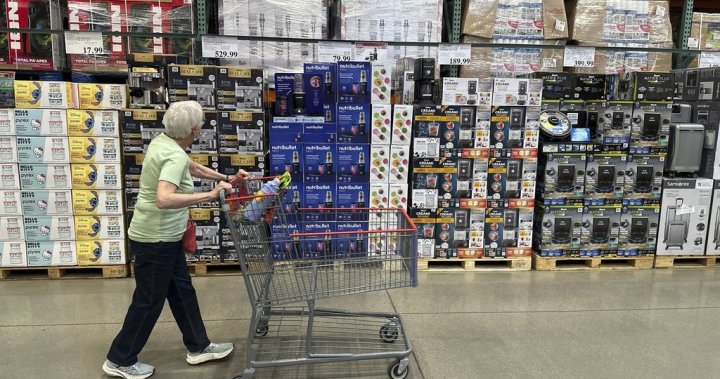As U.S. President Donald Trump’s tariffs continue to impact companies globally, Costco says it’s trying to limit the hit by moving sourcing for in-house brands like Kirkland within the countries with tariffs.
During a third quarter earnings call last week, the company said it had seen US$62 billion in net sales, an eight-per cent increase from the same quarter last year.
Company executives said during the call they’ve been actively looking for ways to avoid impacts from tariffs, with chief executive Ron Vachris saying this included looking at its Kirkland brand and products sold at Canadian Costco locations.
“We rerouted many goods sourced from countries with large tariff exposure to our non-U.S. markets,” he said.
“We continue to move more Kirkland Signature product sourcing into the countries or regions where items are sold and this is helping us to lower costs and mitigate some of the potential impacts of tariffs.”
In addition, Vachris said the company also brought in items it had planned for summer earlier, while sourcing additional locally-produced goods to stay in stock and reducing that tariff impact.
Trump’s various tariffs have taken effect in the past few months, right in the middle of the third quarter.
Steel and aluminum tariffs, which can impact those that use aluminum and steel in their packaging of foods and other items, were imposed by Trump on Canada in March.

Get daily National news
Get the day’s top news, political, economic, and current affairs headlines, delivered to your inbox once a day.
Trump then threatened this weekend that he planned to put an added 25 per cent, raising the duties to 50 per cent, a move those industries warned would “create mass disruption and negative consequences.”
The duties placed on its northern neighbour related to fentanyl and border security were also imposed in March.
Canada, while excluded from Trump’s global “reciprocal” tariffs, also faces duties on the country’s automobile sector.
The tariffs Trump imposed on Canada over fentanyl and border security, as well as his global “reciprocal” tariffs, were briefly blocked last week by a U.S. federal court, but the U.S. Court of Appeals for the Federal Circuit then stayed the order, allowing those duties to remain in place.
Some Canadian companies are also taking steps to source products from places other than the U.S.
That comes amid both retaliatory tariffs on U.S. goods and a strong “Buy Canadian” consumer sentiment.
Sobeys says it’s accelerating the efforts by working with national brands, while also expanding its private-label Compliments brand “to further strengthen the presence of local products.”
It added that the items are identified in store and online through its “Shop Canada” labelling.
Metro said in a statement it is also working with suppliers to “offer the best possible value” for consumers and prioritize local Ontario and Canadian products where possible.
Loblaw said it also is trying to “source more local goods” where possible to support customers and Canadian business partners. They added while there are still cases they have to purchase from the U.S., they’re continuing to look for alternatives from other countries.
Global News reached out to Walmart Canada to inquire how the companies are working to avoid tariff impacts and if those efforts include sourcing more Canadian items, but did not hear back by publication.
© 2025 Global News, a division of Corus Entertainment Inc.
Read the full article here
